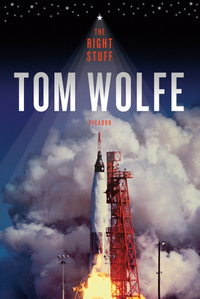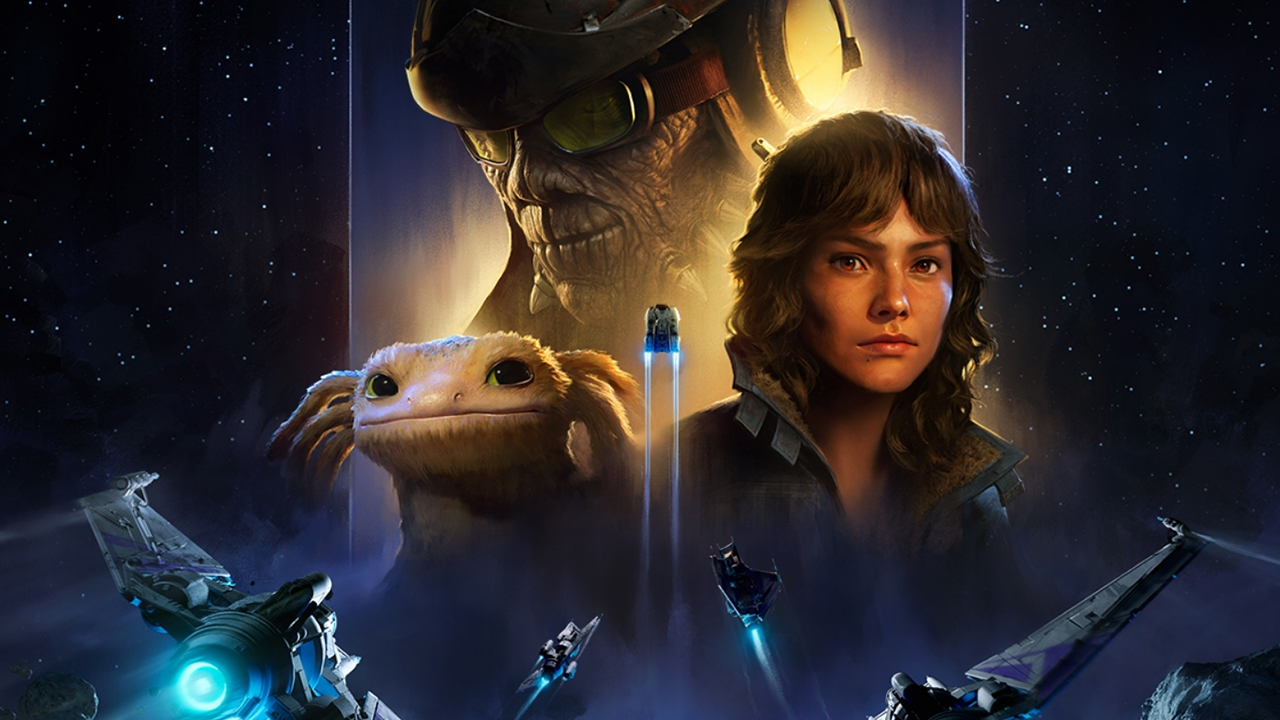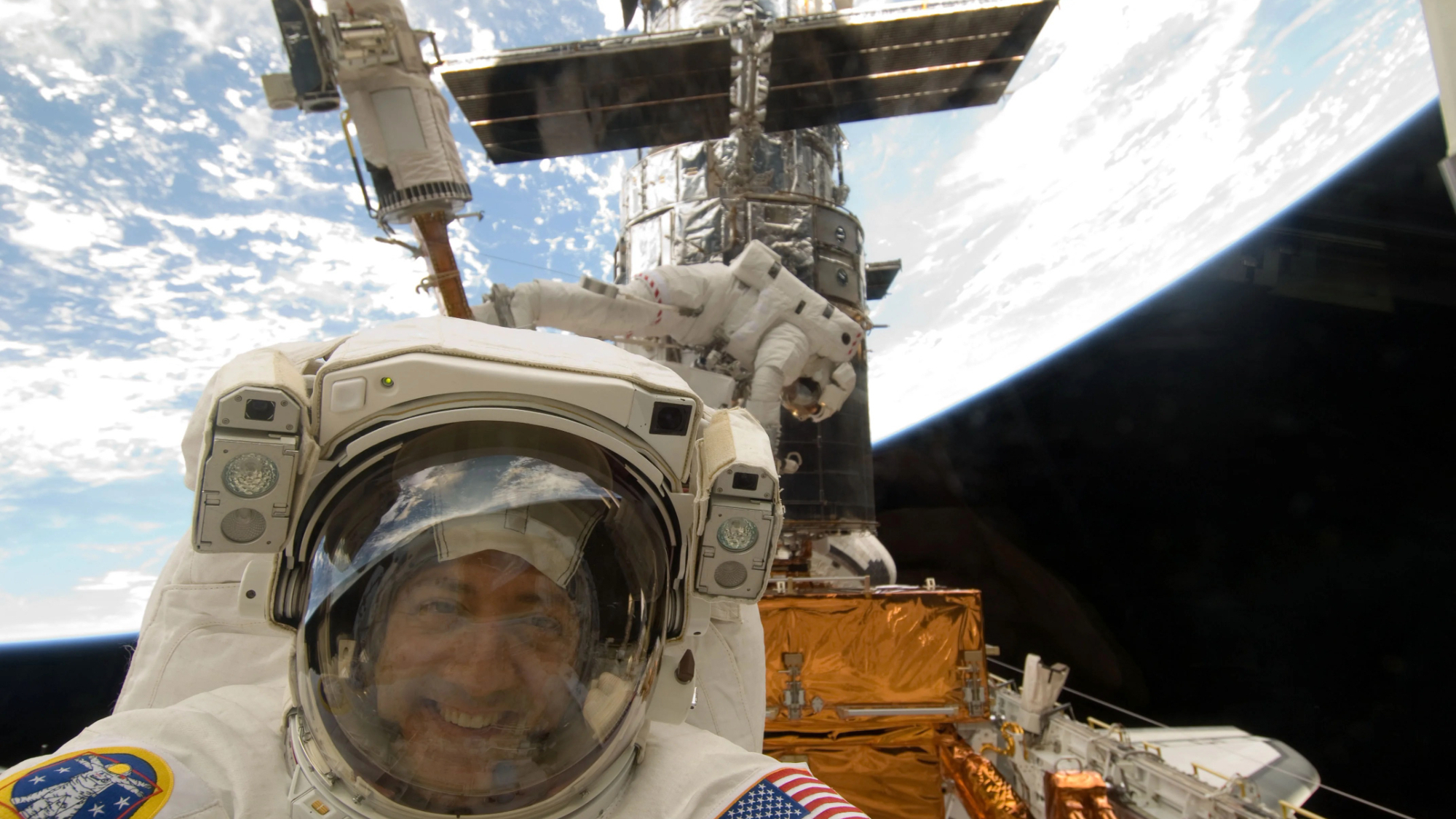'The Right Stuff' recap: Who is going to be first? ('The Kona Kai Séance')
An astronaut's indiscretion leads to drama in Episode 5.
Who will become the first American to launch into space — and how he is chosen — is answered in the fifth episode of National Geographic's "The Right Stuff."
Based on journalist Tom Wolfe's 1979 book by the same title, the Disney Plus series sets the competition to be first to fly against the fallout from earthly temptations in "The Kona Kai Séance."
Warning: What follows contains spoilers for the episode "The Kona Kai Séance." Skip ahead to the end if you only want to read about the space history portrayed.
Related: These astronauts read 'The Right Stuff' and flew in space
- Want to try Disney Plus? You can get a 7-day free trial here
- Sign up for Disney Plus for $6.99/month
Episode 5: 'The Kona Kai Séance'

"Today we will decide the flight order for the first three astronauts."
Space Task Group director Bob Gilruth (Patrick Fischler), joined by flight director Chris Kraft (Eric Ladin) and flight controller Glynn Lunney (Jackson Pace), holds a meeting with the Mercury 7 astronauts: John Glenn (Patrick J. Adams), Alan Shepard (Jake McDorman), Gordon Cooper (Colin O'Donoghue), Gus Grissom (Michael Trotter), Wally Schirra (Aaron Staton), Scott Carpenter (James Lafferty) and Deke Slayton (Micah Stock).
The men anxiously wait on what Gilruth is going to say next when the scene fades to black, the title card rolls and the episode picks up three days earlier on the other coast. The astronauts are in San Diego, at a beachside bar where they are being hosted by Convair, manufacturer of the Atlas rocket that will be used to launch the first Americans into Earth orbit.
Get the Space.com Newsletter
Breaking space news, the latest updates on rocket launches, skywatching events and more!
LIFE magazine writer Loudon Wainwright Jr. (Josh Cooke) is with the astronauts on this press tour. "We've been constantly on the move, flying from one contractor to another, bucking up spirits to keep the assembly lines moving, keep everybody on task," Cooper tells Wainwright, "but it seems like we have been doing it nonstop."
The Right Stuff by Tom Wolfe | Save 43% |
Now $10.89 on Amazon
Read the book that inspired a generation of engineers, scientists and astronauts and retells the early days of human spaceflight.
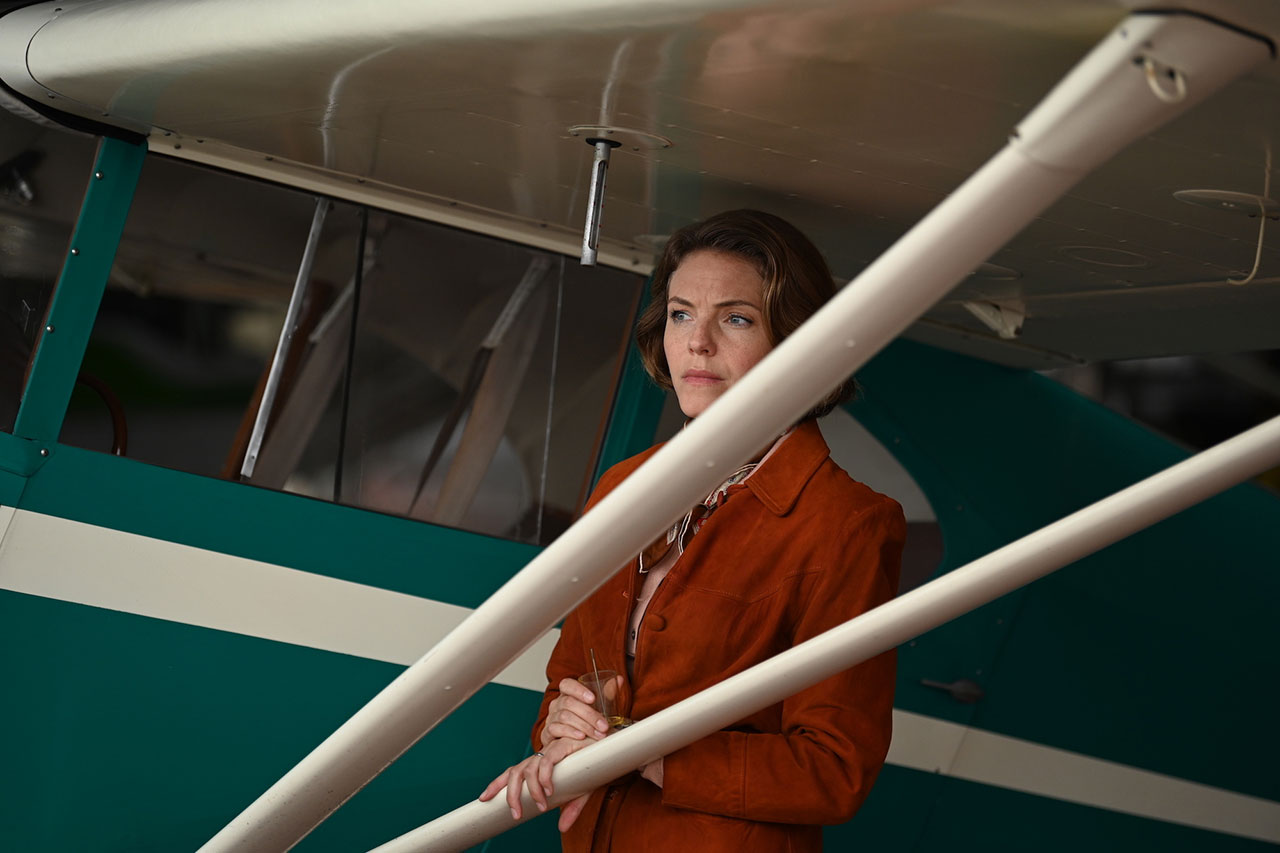
"It does get old," says Cooper, "all those rubber chicken dinners and spending so much time away from the family."
Back in Virginia at the Hampton Women's Aviation club, Trudy Cooper (Eloise Mumford) is about to go for a flight in a Piper Pacer when she is told by the club's secretary, Doris (Elizabeth D'Onofrio) that she has a visitor. "I want to go into space, I'd like your husband to help," Jerrie Cobb (Mamie Gummer) tells Trudy.
Cobb would like Cooper to lend his support publicly for her and other women to fly in space. "I've just come from the Lovelace Clinic. They put me through all the same tests that the astronauts did and I passed them," says Cobb. "I'm not on a solo mission. I want to build a female astronaut corps, and I want you to be a part of it."
In California, the Mercury astronauts are getting ready for an evening gala. As the other men straighten their neckties (a bowtie in Glenn's case), Shepard, alone in his room, doubles over as he continues to struggle with a ringing in his left ear, a symptom he first experienced after a simulator run (as shown in Episode 3). By the time all seven men arrive in the Kona Kai hotel lobby, Shepard has recovered.
"Ricky Carsrud died," Schirra tells the other men, referring to a fellow naval aviator and friend who had been one of the candidates screened for the Mercury program. "He flamed out over the Chesapeake this morning."
Related: The Mercury 7 astronauts: NASA's first space travelers
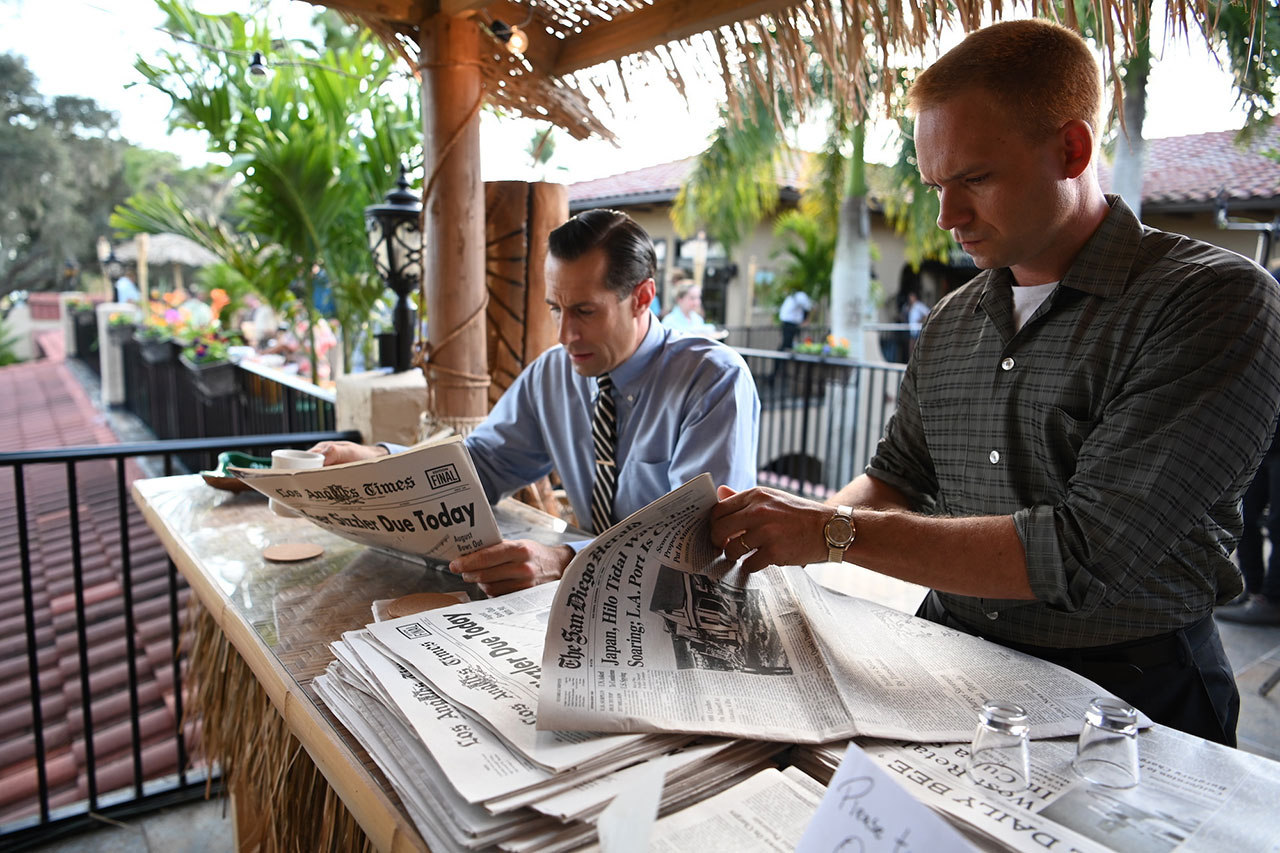
Schirra and the others are supposed to be heading into a dinner hosted by Convair to provide a morale boost after a hard year for the company. The death of Schirra's friend, though, hits him hard, and he cannot bring himself to enter the party. Shepard suggests they all "take a breather" and head out to the beach for a drink. Glenn volunteers to stay behind and represent the others.
Out on the beach, the men commiserate over having to shake so many hands when Glenn arrives. Schirra shares a story about a close call he and Carsrud had flying together. Grissom, in turn, raises his close call with Cooper (as recounted in Episode 3), only this time it leads to Cooper admitting he was at fault and the two astronauts reconciling. "It is all in the past," replies Grissom.
Glenn, who usually sticks to soda water, pours himself a shot of whisky and tells the others about his own brush with death while flying in Korea. "I always thought in a moment like that I would feel close to God, I'd feel a oneness with my creator, but I didn't. I didn't feel anything," he says.
Carpenter completes Glenn's story, revealing how Glenn overcame the odds and went back to save another pilot. Glenn shrugs it off, saying it's just "what we do" at war. "Not everybody would do that," says Cooper.
The men head off in different directions. Glenn and Cooper go back inside, while Carpenter leads Schirra, Slayton and Grissom to a bar at the harbor. Shepard tells Glenn he is going to stay at the beach and finish his drink before going back in.
Glenn and Cooper, sitting at the hotel bar, discuss the flight order decision. Glenn is concerned his chances may be hurt by having brought President John F. Kennedy's science advisor, Jerome Wiesner, to a New Year's Eve party (as shown in Episode 4). "Just seems like my star has fallen a bit since then," he says.
A hotel staff member brings an urgent message for Cooper "from a lady." The note reads, "I've come to rescue you." Glenn frowns until Cooper reveals it's from Trudy. She has flown in to see her mother and for an evening alone with her husband.
Glenn heads into the Convair event as an announcer introduces him to the round of applause.
Later that night, Shepard shows up at Glenn's hotel room. "I've messed up," says Shepard. "I did something stupid." Shepard had taken a cab down to Tijuana, drank a lot and hooked up with a woman at some little hotel. "We were coming out, I saw a flash from a camera. I chased after him and I couldn't catch them; there were two, one was a photographer and the other was a reporter with the San Diego Herald. There are pictures, they are going to run it tomorrow."
Fearing what the story would do to the space program, Glenn tells Shepard he will take care of it. "John, NASA can't find out. The [flight] order is coming down," says Shepard before heading off to bed.
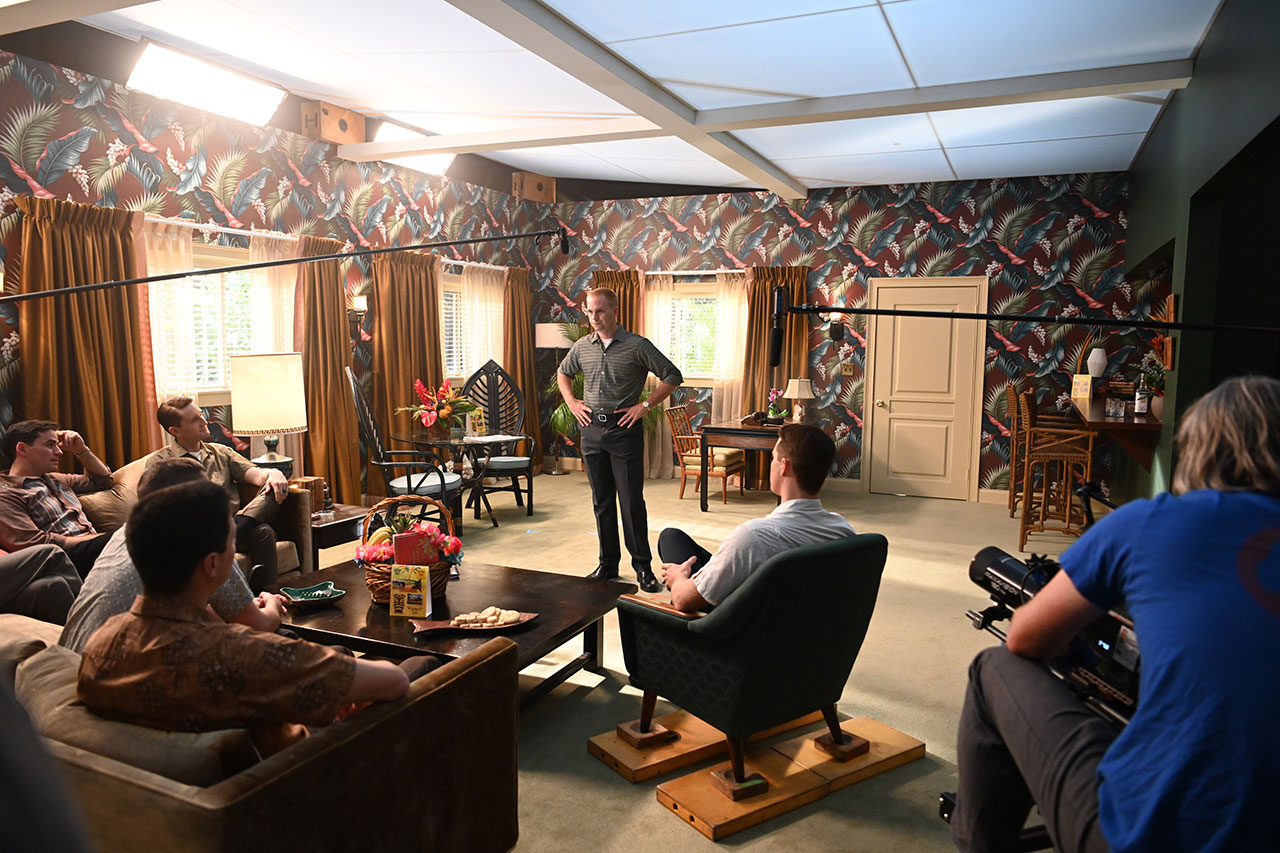
Glenn tries to track down the editor at the newspaper, but, failing to get to him on the phone, Glenn calls NASA public affairs officer Shorty Powers (Danny Strong) for help. Glenn tells Powers that one of the guys screwed up, but does not mention Shepard by name. Powers gives Glenn the number for the editor, Samuel Evans (Randall Newsome), who is not happy about being woken up in the middle of the night. "We're running it," he tells Glenn.
"The news is a first draft of history, isn't that what they say?" says Glenn. "Then I am asking you — well, let's be honest, I'm begging you — just this once, just for tonight, I am begging you, Mr. Evans, think about that last draft of history. You know, the one that never gets rewritten. Think about what you want that to say."
Evans hangs up without giving Glenn an answer.
The next morning, Glenn checks the San Diego Herald. The story is absent from the paper, but Glenn tells Shepard to gather the guys.
Meanwhile, having spent the night together, Cooper and Trudy are resting in his hotel room bed. Trudy tells Cooper about Cobb's plans for a group of women astronauts. "An astronaut, you're joking," says Cooper. "Is that why you decided to come out here and spend the night, so you could spring this on me?" Trudy is disappointed in Cooper's reaction. Only wanting for his wife to be happy, Cooper changes his approach. "Another astronaut in the family? Okay then, I guess," he says to Trudy's delight.
Schirra knocks on Cooper's door. "We've got a séance, right now, Glenn called it, says it's important. Get dressed."
Glenn addresses the other six astronauts in a parlor room. "Something happened last night, an indiscretion let's say. The details of it don't matter, it happened and now it's done. What matters is that we all need to agree on a few things about how we are going to conduct ourselves from this point on." Shepard admits it was him and tells the others what happened.
"We're heroes here," says Glenn. "We haven't even done anything yet, but that is how folks see us, and all we have got to do is not screw that up. What happened last night put the program at risk, make no mistake. We have to make sure nothing like that happens again."
Glenn then lets it slip that he called Powers for help. "You called Shorty?" Shepard asks. "So NASA knows about all of this?" Shepard turns on Glenn. "I can't believe you, John. This is about being first. You heard they were about to choose and figured this would cinch it for you. That's why you did it. You sold me out so you could win."
Glenn protests that he was only trying to help, but Shepard does not believe him. Glenn asks the others to have some self control. "We wouldn't be the pilots we are today if we didn't have control," says Shepard. "But do we have appetites? Yeah, I am a human being and I'm going to die one day. We all are. We are test pilots and we get that fact, we stare it in the face for a living."
Glenn continues to insist that he was only trying to help the others, to help the program. "It's always about the good you did, how good you are. Admit it, you think you're better than me, don't you? You think you're better than all of us," Shepard says. "So what if I think it," replies Glenn, raising his voice, "I've saved you! I've saved all of you, goddamnit!" The men stare back at him in silence.
Shepard gets up to leave. "I trusted you, John, and you used it against me. It will probably work. You probably will be first, but the men in this room, all of us, will know what you did to get there," he says.
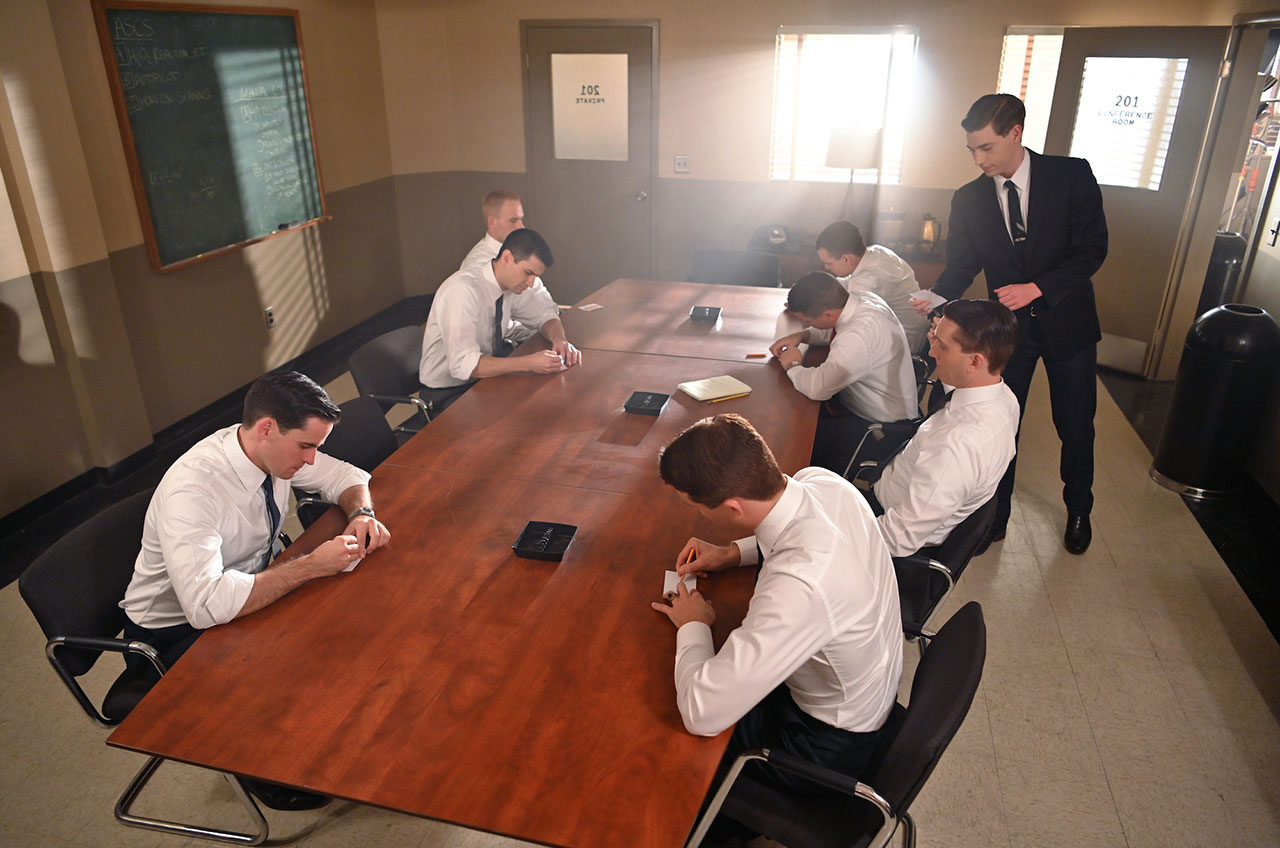
The scene switches back to Langley Research Center and the conference room from the start of the episode.
"Today we will decide the flight order for the first three astronauts. We will know among ourselves who is going first, second and third," says Gilruth. "But nothing will be announced to the public just yet."
"You have been together, day in and day out for over a year now. You've spent more time with each other in that year than you have with your own families. In a sense, you've become a family, and I believe that you know your brothers better than Chris or I ever could, so this will be a peer vote," Gilruth says, as Lunney hands out paper and pencils. "I ask one simple question: if you could not make the flight yourself, who would you choose? Write down that name."
Gilruth tallies the votes and then burns the sheets of paper. He writes the rankings on a chalkboard that is facing away from the camera. All but Glenn, Shepard and Grissom get up and leave the room.
Grissom stands up, shakes Shepard's and Glenn's hands and also leaves. Glenn then stands up, walks over to Shepard on the opposite side of the room and offers his hand, which Shepard shakes. Glenn leaves.
Shepard stands up and looks back at the board. The list reads: 1) Shepard; 2) Grissom; 3) Glenn
Building Project Mercury: Test flight photos of NASA's first spaceship
The right, wrong and real stuff
At the start of the episode, a disclaimer appears on screen: "This dramatization, although fictionalized, is based on actual events. Dialogue and certain events and characters have been created or altered for dramatic purposes." Here is a look at some of the right, wrong and real stuff the fifth episode portrays:
- The Mercury astronauts did lament their constant travel. As John Glenn wrote in his memoir (Bantam, 1999), "Langley [in Virginia] had gotten to a place where we went back to get clean skivvies and shirts, and that was about all." One of the places they visited was Convair in San Diego, a division of General Dynamics. They went to learn about the Atlas atop which some of them would fly, but "our visits had another purpose, too," wrote Glenn. "It was to encourage the workers.”
- By 1960, Jerrie Cobb had gained fame setting world aviation records and, as mentioned in the episode, she underwent the same physical and psychological evaluations that the Mercury astronauts were subjected to as part of a private initiative administered by Dr. Randy Lovelace. She and 12 other female pilots became known as the First Lady Astronaut Trainees, or FLATs. (Decades later, they would be dubbed the "Mercury 13.")
- As a pilot herself, Trudy Cooper very likely knew of Cobb, but it is unclear if the two ever met in real life.
- Naval aviator Ricky Carsrud (played by Adam Hose in Episode 1) is a fictional character, but his story is representative of the pilots and friends who were killed in aircraft accidents.
- The story that Glenn (Adams) tells about flying with a pilot named "Frank Giraudo" in Korea is based on the real-life experiences of the astronaut and a pilot named John Giraudo. The details are mostly the same, except the outcome is omitted. Glenn did head back out in another plane to circle where Giraudo had gone down, but the helicopters that were supposed to meet Glenn never showed. As it happened, though, Giraudo had already been captured and it was not until a later prisoner-of-war swap that Glenn and Giraudo were reunited.
- According to Glenn's memoir, it was Shorty Powers who called him one late night at the Kona Kai after "a leading West Coast paper had called him [Powers] for reaction to a front-page story it was planning to publish the next morning." Glenn then called the editor to make his appeal for the story to be pulled. Glenn never publicly revealed who the astronaut was who had been caught in the compromising photos, but a Naval Academy classmate of Shepard's said that Glenn once told him it had been Shepard ("Light This Candle," Neal Thompson, Crown Publishers, 2004).
- The séance at the Kona Kai was not the first time Glenn had called for the astronauts to meet, but it was the best known and, by multiple accounts, it altered the bond between the seven men. "It's been described in practically everything that's been written about Project Mercury, most notably by Tom Wolfe in 'The Right Stuff,'" Glenn wrote.
- Gilruth invited the Mercury 7 to his office on Jan. 19, 1961, to hold the peer vote. The ballots were never made public, but by their own accounts Glenn and Carpenter voted for each other, Schirra wrote down Shepard and Cooper chose Grissom (the votes of the other three are unknown). Gilruth took the results into consideration and later that same day informed the seven astronauts of his decision. The press and public were only told that Shepard, Grissom and Glenn were training for the first flights, but not the order in which they would fly.
A new episode of National Geographic's "The Right Stuff" begins streaming on Disney+ every Friday through Nov. 20. Return to collectSPACE.com for weekly recaps.
Follow collectSPACE.com on Facebook and on Twitter at @collectSPACE. Copyright 2020 collectSPACE.com. All rights reserved.
Join our Space Forums to keep talking space on the latest missions, night sky and more! And if you have a news tip, correction or comment, let us know at: community@space.com.

Robert Pearlman is a space historian, journalist and the founder and editor of collectSPACE.com, a daily news publication and community devoted to space history with a particular focus on how and where space exploration intersects with pop culture. Pearlman is also a contributing writer for Space.com and co-author of "Space Stations: The Art, Science, and Reality of Working in Space” published by Smithsonian Books in 2018.In 2009, he was inducted into the U.S. Space Camp Hall of Fame in Huntsville, Alabama. In 2021, he was honored by the American Astronautical Society with the Ordway Award for Sustained Excellence in Spaceflight History. In 2023, the National Space Club Florida Committee recognized Pearlman with the Kolcum News and Communications Award for excellence in telling the space story along the Space Coast and throughout the world.

